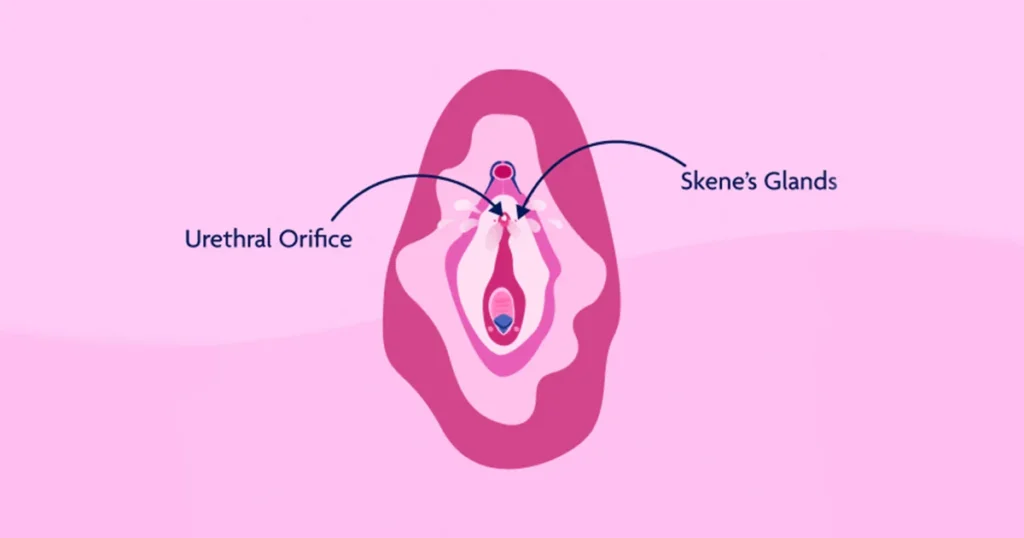The topic of female sexuality, particularly aspects like squirting, often remains shrouded in mystery and misconceptions. This becomes even more complex when considering life stages such as menopause. “Can You Squirt After Menopause?” is a question that might arise in the minds of many women undergoing this natural transition.
This article aims to shed light on this subject, exploring the physiological changes during menopause and their impact on sexual experiences like squirting.
It’s important to remember that every woman’s journey is unique, and understanding these changes can lead to a more fulfilling sexual life post-menopause. So, let’s delve into this intriguing topic.
What is Female Ejaculation?
Female ejaculation refers to the expulsion of fluid from the Skene’s glands (sometimes referred to as the female prostate) or other parts of the urethra during or close to an orgasm. The Skene’s glands are located near the end of the urethra, and their openings are near the entrance of the vagina.

When stimulated, these glands produce a fluid that can be expelled during orgasm. Not all women experience this, and for those who do, the amount, frequency, and consistency of the fluid can vary greatly.
The composition of the ejaculate can differ. It’s typically a clear or milky fluid that is distinct from urine, though it often travels through the same pathways as urine, which leads to some confusion. Scientific analysis shows that the fluid can contain prostatic acid phosphatase (an enzyme found in male semen), fructose, glucose, and trace amounts of creatinine and urea.
Recommended: Can a Woman Have an Orgasm After Menopause?
It’s hard to pin down exactly how common female ejaculation is. Some studies suggest that anywhere from 10% to 54% of women have experienced it at some point in their lives. There’s a lot of variability here, partly because it depends on physiological factors and also on whether the woman herself or her partner identifies the occurrence.
Menopause and Sexual Changes
Menopause is a significant milestone in a woman’s life, marked by the end of menstrual cycles. It’s not just a single event, but a gradual transition that includes perimenopause (the time leading up to menopause) and postmenopause (the years after menopause). This transition can bring about numerous changes, not least of which are those affecting sexual health and experience.
What Happens During Menopause?
Menopause typically occurs between the ages of 45 and 55, though it can happen earlier or later. It’s officially diagnosed after a woman has gone 12 consecutive months without a menstrual period. The process is natural and is a part of aging, but the changes in hormone levels, particularly the decrease in estrogen, can lead to symptoms that affect a woman’s sexual health.
Recommended: What Does an Invalid Pregnancy Test Mean?
Common Sexual Changes During Menopause
- Vaginal Dryness: One of the most common complaints during menopause is vaginal dryness. Reduced estrogen levels can lead to thinner, less elastic, and more fragile vaginal tissues. This can make sex uncomfortable or even painful, which may decrease sexual desire.
- Decreased Libido: Many women experience a drop in their sexual desire during menopause. This can be due to hormonal changes, but also psychological factors like changes in body image, stress, or fatigue.
- Changes in Arousal and Orgasm: You might find that it takes longer to get aroused, and orgasms might not be as intense as they were before. This can be directly linked to hormonal changes, as well as to other physical changes happening in your body.
- Emotional and Psychological Changes: Menopause can also bring about mood swings and emotional shifts, which can affect a woman’s interest in sex. Factors like anxiety, depression, and changes in self-esteem can interfere significantly with sexual health.

Menopause is a natural phase of life that brings changes, including in sexual health. While these changes can be challenging, with the right information, support, and treatments, it’s entirely possible to continue enjoying a satisfying sexual life.
Recommended: Does Sex Affect Periods?
Understanding and accepting these changes as a normal part of aging can also help you adapt more smoothly to the new realities of your body and sexuality.
The Effect of Menopause on the Ability to Squirt
Yes, it is possible for some women to experience squirting, or female ejaculation, after menopause. However, the experience can vary significantly from woman to woman, influenced by changes in the body that occur due to menopause.
Understanding how menopause affects the body can help in managing expectations and experiences regarding sexual function, including squirting.
Certain factors can affect a woman’s ability to squirt after menopause. They include:
- Hydration and Vaginal Health: Staying well-hydrated and using vaginal moisturizers or lubricants can help in maintaining vaginal health and might aid in achieving ejaculation.
- Pelvic Floor Health: The strength and health of pelvic floor muscles play a critical role in the ability to ejaculate. Menopause can weaken these muscles, but targeted exercises, like Kegels, can help strengthen them.
- Hormone Replacement Therapy (HRT): Some women find relief from menopausal symptoms through HRT. It can help in managing dryness and maintaining libido, which might indirectly support the ability to squirt.
Recommended: Does Family Planning Affect Future Pregnancy?
While menopause can change how a woman’s body responds sexually, it doesn’t inherently eliminate the possibility of squirting. With the right understanding, care, and approach, women can still enjoy a fulfilling sex life, including experiences of squirting, after menopause.

Enhancing Sexual Experience Post-Menopause
Enhancing sexual experience post-menopause can be a vital aspect for many women to maintain their quality of life and intimate relationships. Menopause brings hormonal and physical changes that can affect sexual function, but there are various strategies and approaches to help manage these changes and enhance sexual experiences. Here are some effective ways to approach this:
1. Addressing Vaginal Dryness
Vaginal dryness is a common symptom of menopause that can make sex uncomfortable or even painful. Addressing this issue can significantly improve the sexual experience.
Water-based and silicone-based lubricants can reduce friction and enhance comfort during sex. Unlike lubricants, moisturizers are used regularly to improve the overall moisture content of the vaginal tissue. When applied directly to the vaginal area, topical estrogens can help restore vaginal tissue health and moisture.
Recommended: How To Get Rid Of Smelly Discharge During Pregnancy
2. Hormone Replacement Therapy (HRT)
HRT can alleviate many menopausal symptoms, including those affecting sexual health. This typically involves estrogen or a combination of estrogen and progesterone, which can help manage many symptoms of menopause, including decreased libido and mood swings. It’s essential to discuss the benefits and risks of HRT with a healthcare provider to determine if it’s a suitable option.
3. Pelvic Floor Exercises
Strengthening the pelvic floor muscles can enhance sexual sensation and potentially improve the ability to achieve orgasm. Regular Kegels can strengthen pelvic muscles and improve control over these muscles during sex. Also, a pelvic floor physical therapist can provide targeted exercises and strategies to improve pelvic health.
4. Exploring New Sexual Activities
Experimenting with new sexual activities can reinvigorate one’s sexual life. Many women find that vibrators or other sex toys can help them them achieve orgasm more easily during or after menopause. Different sexual positions can provide more comfort or enhance pleasure, adjusting for any physical limitations.
Recommended: What Causes Erectile Dysfunction in Your 50s?
5. Open Communication
Openly discussing sexual needs, desires, and any difficulties with a partner is crucial. Emotional closeness and a relaxed environment can help improve sexual responsiveness. Clearly communicating what feels good and what doesn’t can help partners adjust their approaches.
6. Lifestyle Modifications
General health and well-being also impact sexual function, so maintaining a healthy lifestyle is beneficial. Regular exercise improves overall energy levels, enhances moods, and can increase libido. A balanced diet rich in fruits, vegetables, and whole grains can support overall health, including sexual health. Techniques such as yoga, meditation, or therapy can reduce stress, which is often a hindrance to a fulfilling sex life.
7. Psychological and Emotional Factors
Addressing mental health is as important as physical health. Therapy, especially with a focus on sexual health or couples’ therapy, can address emotional or psychological barriers to a satisfying sex life. Changes in body image with age can affect sexual confidence. Working towards accepting and appreciating the body can enhance sexual well-being.
Recommended: Does Ovulation Make You Emotional?
Enhancing sexual experience post-menopause involves a combination of medical interventions, lifestyle changes, and emotional support. Each woman’s experience of menopause is unique, and finding what works best for an individual may require trying different strategies and having open discussions with healthcare providers and partners.
Conclusion
Embracing strategies to enhance the sexual experience post-menopause is essential for overall well-being and relationship satisfaction. By addressing physical symptoms, fostering open communication, and exploring new approaches to intimacy, women can reclaim joy and fulfillment in their sexual lives.
Remember, every woman’s journey through menopause is unique, so finding what works best may require patience, experimentation, and support from healthcare providers and partners alike.
